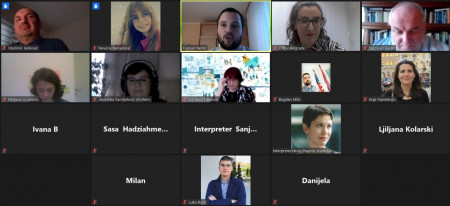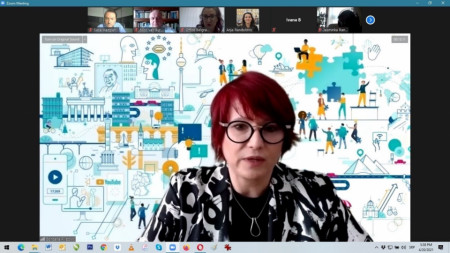Politikas Debate: Sustainable Cities – Social Progress, Economic Development and Responsibility toward the Environment
The debate on the topic „How to achieve sustainable cities?“ took place on Tuesday, 20th of April starting at 17.30 on the Zoom platform. The participants were Nico van Buren, an expert for urban development, special planning and sustainable development from the Eduardo Frei Foundation and Mirjana Jovanović, program manager in the Belgrade Open School for the area of energy, climate and environment. The debate was moderated by Ognjan Pantić, project coordinator in the area of energy, climate and environment in the Belgrade Open School.
When we talk about the environment, we often forget that the problem lies in urban areas, not in the nature.
In his introduction Ognjan Pantić pointed out that „cities take up only 3% of the total territory of the planet and more than 50% of the population live in cities“. On the other side, although they take up a small territory, they have a huge impact upon the environment. Around 60-80% of energy consumption is tied to cities at the global level, 75% of carbon-dioxide and 60% of resources consumption. That means practically that those urban environments are responsible for ecological problems everywhere. The issue of sustainable city management has become recognized as significant on different levels. In the Agenda 2030 the United Nations have dedicated a goal to sustainable cities. Through the new European Green Deal the European Union has envisaged, among other things, the renovation of a huge part of residential areas in EU cities. New planning documents have been worked on in the Republic of Serbia, which have to reflect the goals and obligations of sustainable development. We can only expect an increase of the number of inhabitants of cities in future as well as an increasing pressure of cities toward the natural resources and more pollution. We can also expect that current rates of generated waste will be increased by 70% until 2050. Because of all that, it is important to talk about the issue of sustainable cities on all levels and with the highest participation of citizens in the decision making process when it comes to their life and to the future of the planet.
What is a sustainable city?
When it comes to the concept of sustainable cities Mirjana Jovanović pointed out that „the creation of cities is the result of the desire of people to organize resources of the society, of nature as well as other resources in order to be able to make their lives easier. Now all of a sudden there is a different paradigm and we live in overcrowded cities with an infrastructure which doesn’t function, where we are exposed to air and water pollution. We have cities which are exhausting huge resources and which are no longer good for living in them, in which citizens can no longer live decent lives. Cities are thus becoming unlivable which is a direct consequence of unsustainable management“.
Sustainable cities are cities which are being developed strategically within the resources they have. Thus sustainable development should include social progress, economic development and responsible treatment of the environment. Those components are linked.
How are the Netherlands and Serbia dealing with the sustainability of cities?
When it comes to the perspective of the Netherlands Nico van Buren pointed out that the problem of city sustainability is tackled on different levels and through different projects in the Netherlands. “The first level of projects is focused on the role of local city officials when it comes to the transition of heating and how to move from using gas to other types of heating. There are also projects dealing with the climate adaptation in the Netherlands, i.e. with planning the construction of cities so that they are adapted to the new climate situation, especially when it comes to the frequent floods. The other level of projects deals with the strengthening of the Government’s capacity. There are experimental programs being developed in the Netherlands which deal with the transition of cities from using gas to using other heating sources and more than 400 million euros have been allocated for that. The Government needs to learn how to implement these projects, the citizens have to participate more and all of that has to be improved. The third level is focused on research programs. They are implemented and financed by universities, a few ministries and by the Dutch National Research Agency. That is a scientific research which is trying to offer answers to the transition that our cities will have to go through in the next couple of years. The issue of the increasing sea level is especially important for the Netherlands. In that sense it has to be thought about what the future plans will look like, because in the 22nd century we could lose the western part of our country so we have to think about preparing for that situation”, Nico van Buren said.
When it comes to Serbia, Mirjana Jovanović said that “planning the spacial development on sustainable foundations includes taking into account all natural processes which are happening in that space and all resources which are part of the city or nature area. What the Belgrade Open School is looking at the most is whether the sustainability is worked on with the participation of citizens and in the interest of citizens and how do the citizens understand the processes in which the decisions about their city and their country are made. At the moment the Spacial Plan of the Republic of Serbia is subject to public review. That is a public policy for the period until 2035 and we are doing everything we can in order for as many citizens as possible to find out about it and to participate, to take a look at what is being planned in their region and to say whether they think that is sustainable or not. Apart from that, public policies are a huge topic, especially within the Agenda 2030 and in connection to the development plans which all cities and municipalities have to adopt by the end of 2021. We are trying to include in those development plans the principles of sustainable development and of sustainable use of natural resources”.
How can sustainable and livable cities be created?
“Cities with a smaller population have a smaller energy consumption. The goal is to transfer 60-70% of traffic to one of the means which does not use energy or which consumes less energy, such as walking or riding a bicycle. There are also plans about how to use the greenery and water in order to make the city more livable, especially in the summer months”, Nico van Buren said.
One of the ways to achieve sustainability is circular economy, i.e. circular urban development. “That is a concept that everybody can understand. It includes, for instance, that waster material will represent a new value. It includes how to build circular concrete houses, what to do with old buildings, how to organize the market and how urban planning can support the circular approach, how to organize the logistics and distribution which go hand in hand with the circular economy. A circular house should be part of the circular urban development. We should see how to introduce the circular approach into the sewer system, into other elements, into the management of greenery in your public space. Those are all components which require a systemic solution and which are yet to be developed”, Nico van Buren concluded.
“When we talk about Serbia, we must think about the next 10, 20, 30 or 100 years in order to be able to talk about sustainability at all. It is necessary to give up the paradigm of unlimited economic growth and to accept and acknowledge that we are living in a limited ecosystem where the resources are limited. We have to learn to live within the boundaries of that ecosystem if we want to have quality lives”, Mirjana Jovanović concluded.
Sustainability is not something that can be achieved over night. It requires planning and thinking a few decades in advance on all levels, from the national to the level of local self-government. It is very important for the citizens to be informed and to participate in the decision making process, to understand the consequences of the decisions which are being made today for their future. Serbia needs a strategic approach and consistency in implementing plans and regulations.
The next PolitiKAS debate will take place on Tuesday, 11th of May 2021. The main topic will be the Potential of New Political Parties in Europe. For more information, please visit our website.
Tel: 381 11 3065 800
E-mail: politikas@bos.rs
Bulevar oslobodjenja 177
11000 Belgrade


